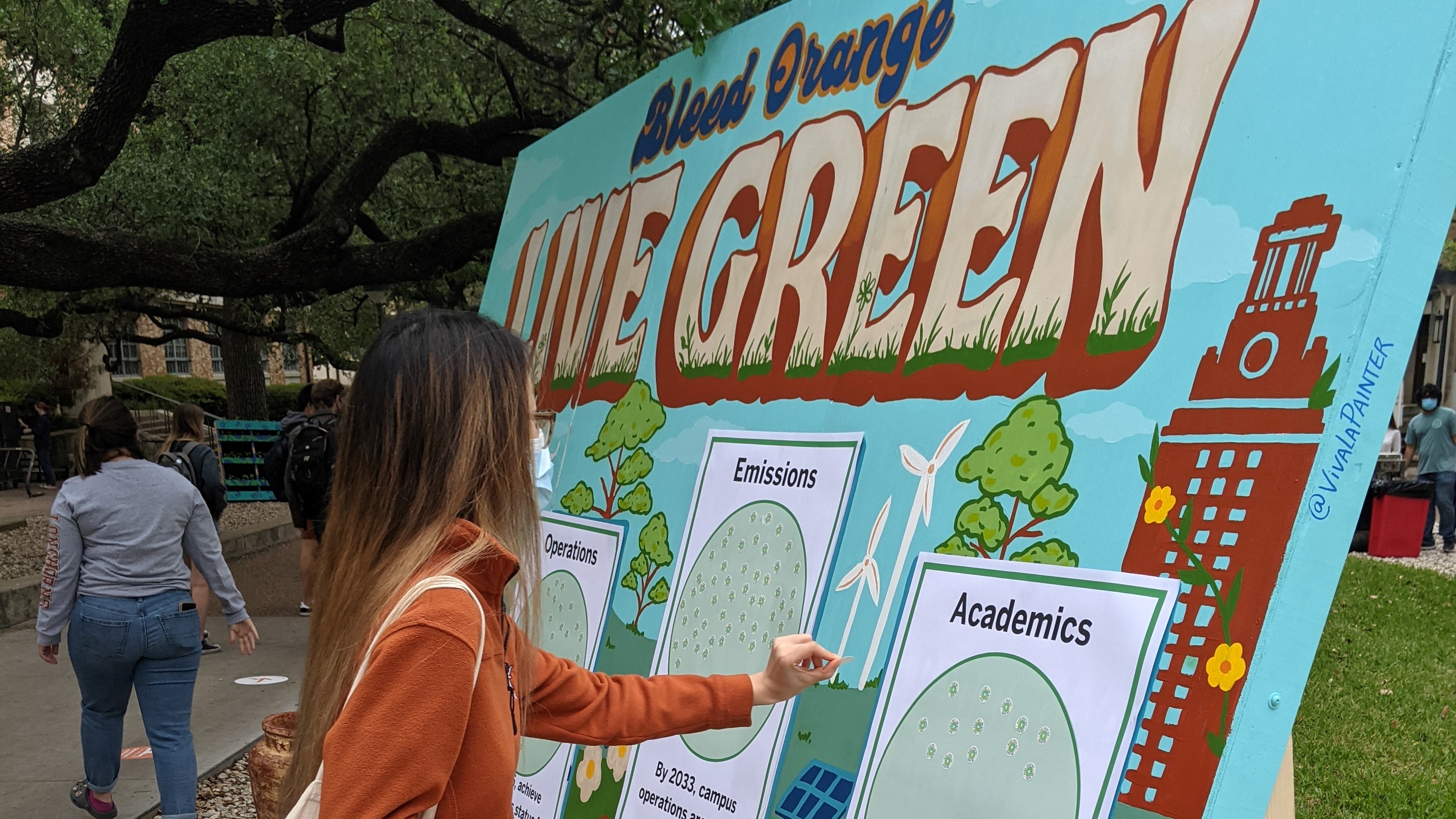In the photo: Students provide input on the update to the campus Sustainability Plan at an Earth Day event on East Mall.
Blog post by Sri Chappidi, 2020-2021 Office of Sustainability Intern and Sustainability Policy Director for UT Student Government. Sri graduated in May 2021 with a degree in Computer Science and a Bridging Disciplines certificate in Environment & Sustainability.
Public pressure to tackle climate change has been at the forefront of many social and political conversations and movements. As youth movements garner more support and legitimacy, it is up to universities to be the catalyst for large-scale change and listen to the demands of their students.
To better inform decisions at the University it is important to understand exactly what students want. So during the Fall of 2020, I as an intern for the Office of Sustainability conducted a series of focus groups to better understand student perspective and thoughts about UT’s efforts in sustainability, environmental justice and student engagement. Over the course of the semester 7 focus groups were conducted with a total of 35 students across 22 different majors. Dr. Lucy Atkinson from the Stan Richards School of Advertising who helped oversee the process said “The variety of majors represented in these focus groups is particularly helpful. It allows us to develop a more nuanced understanding of how different corners of campus understand and think about sustainability.” Parallel to these focus groups was the five year update of UT’s Sustainability Master Plan (SMP) by the PSSC or the President's Sustainability Steering Committee. This plan offers strategies and goals for the university to further its sustainability efforts. The focus groups I conducted were also used in an attempt to understand student priority and engage a diversity of students to better inform the SMP update.
The first portion of the study focused on environmental justice. Environmental justice is the fair treatment and meaningful involvement of all people, regardless of race, color, national origin, or income, with respect to the development, implementation, and enforcement of environmental laws, regulations, and policies. It is often seen as an integral part of the intersectional climate movement. An overwhelming majority of the students did not have a substantive understanding of what environmental justice was unless they were already part of the Campus Environmental Center or another environmental organization on campus. Other students who had a deeper understanding of this topic had majors such as public health, urban studies, or sustainability studies which are traditionally seen as more relevant to climate change and social justice. Most of the education and exposure on environmental justice came from outside of UT and was student-led. However, after a comprehensive discussion on environmental justice, students expressed a strong desire to integrate the subject into existing classes in their curriculum, regardless of major, and felt like the University should take more responsibility in educating students about the topic.
When students were asked what sustainability progress they wanted to see by 2030 on campus, a handful of patterns emerged. Students want to see more renewable energy on campus, this can range from where we invest in relation to the energy grid to solar panels on buildings. Overwhelmingly students want to see more affordable housing in West Campus and connected, efficient public transportation. Better recycling and waste signage, ability to compost, and accountability from the University were also common themes. Lastly, students want to start a genuine conversation about divestments. These are not easy asks from students but they are necessary steps if UT wants to acknowledge the climate catastrophe and contribute positively to climate solutions.
One of my key takeaways from the process of working on the SMP and then doing these focus groups was that to form a comprehensive sustainability policy it is important to engage students. This is not an easy task but it is crucial to reach out to students who have historically not been engaged in campus sustainability and engage students of color and incorporate their opinions and wants in a sustainability plan. I think this can be done by intentionally inviting these students to speak about these issues or do focus groups solely with these groups of students. While I did have high hopes of continuing the focus groups during spring semester with a focus on minority voices, my efforts were stalled due to the continued pandemic, the Zoom burnout, and the unfortunate freeze in Austin.
Overall, an overwhelming majority of students believe sustainability issues need to be a priority on this campus. This means constantly working to engage students in discussions, being transparent in decision making, and communicating UT’s sustainability progress by continuing efforts such as these focus groups. Dr. Atkinson believes, “The conversations that emerge in focus groups are instrumental in helping us understand how students think about sustainability and environmental justice in their own words. These kinds of conversations generate wonderfully rich, deep insights about student perspectives – insights that can be harder to come by in large-scale surveys.” Hopefully we continue to implement these insights and findings to ensure positive change to make UT more green.

